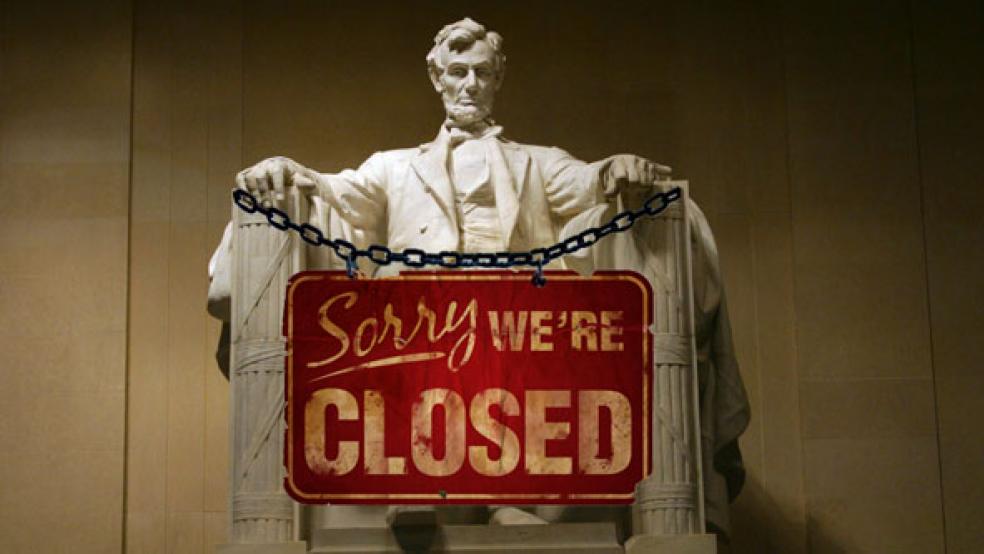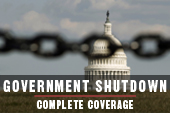Barring some last-minute miracle, it looks like the government is going to shut down at midnight tonight.
The crux of the matter is that the House GOP is not inclined to pass a budget that doesn't include some kind of delay or defunding of Obamacare. And obviously Democrats won't agree to that. So, impasse.
RELATED: GOP TAKES BLAME FOR SHUTDOWN, BUT OBAMA ALSO LOSES
Markets are already falling, it would seem, on the news.
But there are reasons to think this would be good.
Goldman explained why this could be helpful in a note to clients last Friday:
It would be a mistake to interpret a shutdown as implying a greater risk of a debt limit crisis, in our view. It would not be surprising to see a more negative market reaction to a shutdown than would be warranted by the modest macroeconomic effect it would have. We suspect that many market participants would interpret a shutdown as implying a greater risk of problems in raising the debt limit. This is not unreasonable, but we would see it differently. If a shutdown is avoided, it is likely to be because congressional Republicans have opted to wait and push for policy concessions on the debt limit instead. By contrast, if a shutdown occurs, we would be surprised if congressional Republicans would want to risk another difficult situation only a couple of weeks later. The upshot is that while a shutdown would be unnecessarily disruptive, it might actually ease passage of a debt limit increase.
This seems kind of vague, but there are three distinct reasons it could be a positive.
RELATED: HOUSE GOP HAS PLAN C TO AVOID GOVERNMENT SHUTDOWN
• The market is reacting now. It's often said that politicians can't act until they see the stock market crack up in some way. A government shutdown is a good way to precipitate a mini-fall without the kind of full-blown financial collapse we could see in a debt ceiling breach. With the debt ceiling likely to be hit in a few weeks, the pressure builds early.
• The GOP will get blamed. Republicans can claim all they want that it's the Democrats in the Senate that are responsible for the shutdown, but everyone knows that if the government shuts down, and the polls ask which side is responsible, the majority will say the Republicans. This is a fact. So, having the party take a political hit now puts pressure on them to solve this before we hit the debt ceiling.
• A shutdown will bring outsiders off the sidelines and start exerting pressure now. This is a point that Ezra Klein made this weekend. He writes: "One way a shutdown makes the passage of a debt limit increase easier is that it can persuade outside actors to come off the sidelines and begin pressuring the Republican Party to cut a deal. One problem in the politics of the fiscal fight so far is that business leaders, Wall Street, voters and even many pundits have been assuming that Republicans and Democrats will argue and carp and complain but work all this out before the government closes down or defaults. A shutdown will prove that comforting notion wrong, and those groups will begin exerting real political pressure to force a resolution before a default happens."
Not everyone shares this view. Molly Ball writes persuasively in The Atlantic that there's no reason to think a shutdown could "cool the fever," so to speak. And indeed people have predicted many times (incorrectly) that the GOP fever had finally broken. But there are at least three forces that will kick in starting now to help create the situation that will allow Washington to get past the debt ceiling.
Read more from Business Insider:
Here's What Happens if the Government Shuts Down
It Increasingly Looks Like Obama Will Have to Raise the Debt Ceiling All by Himself
Why Republicans Want to Shut Down the Government
The House Majority Whip Just About Guaranteed A Government Shutdown
What the Madness in Washington Means for the U.S. Credit Rating





